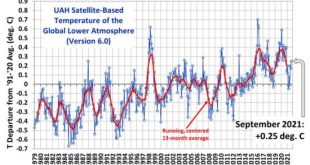Shrinkage because of COVID-19 might supply living proof
Earth Institute at Columbia CollegeProportion Print E-Mail

Volcanic eruptions and human-caused adjustments to the ambience strongly affect the velocity at which the sea absorbs carbon dioxide, says a brand new find out about. The sea is so delicate to adjustments similar to declining greenhouse gasoline emissions that it in an instant responds through taking on much less carbon dioxide.
The authors say we might quickly see this play out because of the COVID-19 pandemic lessening world gasoline intake; they expect the sea won’t proceed its fresh historical development of soaking up extra carbon dioxide every yr than the yr ahead of, and may even soak up much less in 2020 than in 2019.
“We didn’t notice till we did this paintings that those exterior forcings, like adjustments within the enlargement of atmospheric carbon dioxide, dominate the variety within the world ocean on year-to-year timescales. That’s an actual marvel,” stated lead writer Galen McKinley, a carbon cycle scientist at Columbia College’s Lamont-Doherty Earth Observatory. “As we cut back our emissions and the expansion price of atmospheric carbon dioxide slows down, it’s essential to appreciate that the sea carbon sink will reply through slowing down.”
The paper, printed nowadays within the magazine AGU Advances, in large part resolves the uncertainty about what prompted the sea to soak up various quantities of carbon over the past 30 years. The findings will allow extra correct measurements and projections of ways a lot the planet may heat, and what kind of the sea may offset local weather trade at some point.
A carbon sink is a herbal gadget that absorbs extra carbon dioxide from the ambience and shops it away. Earth’s biggest carbon sink is the sea. In consequence, it performs a elementary function in curtailing the consequences of human-caused local weather trade. Just about 40 % of the carbon dioxide added to the ambience through fossil gasoline burning for the reason that morning time of the economic generation has been taken up through the sea.
There’s variability within the price at which the sea takes up carbon dioxide, which isn’t absolutely understood. Particularly, the clinical group has perplexed over why the sea in brief absorbed extra carbon dioxide within the early 1990s after which slowly took up much less till 2001, a phenomenon verified through a large number of ocean observations and fashions.
McKinley and her coauthors addressed this query through the usage of a diagnostic type to visualise and analyze other eventualities that can have pushed higher and lesser ocean carbon uptake between 1980 and 2017. They discovered the lowered ocean carbon sink of the 1990s will also be defined through the slowed enlargement price of atmospheric carbon dioxide early within the decade. Potency enhancements and the commercial cave in of the Soviet Union and Japanese Eu nations are considered a few of the reasons of this slowdown.
However every other match additionally affected the carbon sink: The large eruption of Mount Pinatubo within the Philippines in 1991 prompted the sink to briefly transform a lot greater coincident with the eruption.
“One of the most key findings of this paintings is that the local weather results of volcanic eruptions similar to the ones of Mount Pinatubo can play essential roles in using the variety of the sea carbon sink,” stated coauthor Yassir Eddebbar, a postdoctoral student at Scripps Establishment of Oceanography.
Pinatubo used to be the second-largest volcanic eruption of the 20th century. The estimated 20 million lots of ash and gases it spewed prime into the ambience had an important have an effect on on local weather and the sea carbon sink. The researchers discovered that Pinatubo’s emissions prompted the sea to soak up extra carbon in 1992 and 1993. The carbon sink slowly declined till 2001, when human job started pumping extra carbon dioxide into the ambience. The sea replied through soaking up those extra emissions.
“This find out about is essential for quite a lot of causes, however I’m maximum thinking about what it approach for our talent to expect the near-term, one to 10 years out, long term for the sea carbon sink,” stated coauthor stated Nicole Lovenduski, an oceanographer on the College of Colorado Boulder. “The longer term exterior forcing is unknown. We don’t know when the following giant volcanic eruption will happen, as an example. And the COVID-19-driven carbon dioxide emissions relief used to be under no circumstances expected very a long way prematurely.”
Investigating how the Pinatubo eruption impacted world local weather, and thus the sea carbon sink, and whether or not the drop in emissions because of COVID-19 is mirrored within the ocean are a few of the analysis crew’s subsequent plans.
Via working out variability within the ocean carbon sink, the scientists can proceed to refine projections of ways the sea gadget will decelerate.
McKinley cautions that as world emissions are lower, there might be an meantime segment the place the sea carbon sink will decelerate and now not offset local weather trade up to previously. That additional carbon dioxide will stay within the setting and give a contribution to further warming, which might marvel some other folks, she stated.
“We want to speak about this coming comments. We wish other folks to take into account that there might be a time when the sea will restrict the effectiveness of mitigation movements, and this will have to even be accounted for in policymaking,” she stated.
###
The find out about used to be coauthored through Amanda Fay and Lucas Gloege of Columbia College’s Lamont-Doherty Earth Observatory.
 Daily News Latest trending news
Daily News Latest trending news




